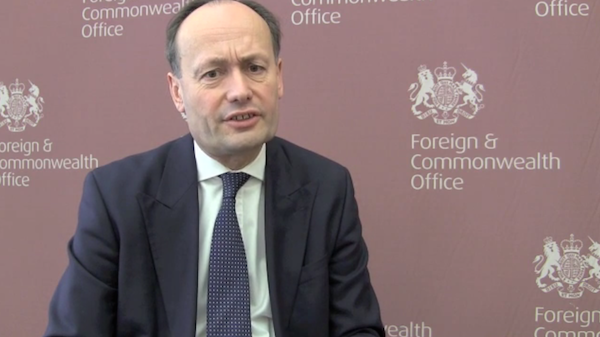The Abbott government derives much of its political capital from ‘national security’ issues but a new report released today has highlighted how Australia's fractious political climate has inhibited defence planning.
The paper was prepared over a six month period by the progressive Centre for Policy Development and draws on the views of a wide range of defence experts to synthesise the risks a changing climate poses to defence operations, as well as how Australia’s preparedness stacks up against other nations.
While the military establishments of the United States and the United Kingdom have integrated climate change into their long-term risk management frameworks, the report found Australia’s military has lagged behind.
One (anonymised) person interviewed by the CPD said that the Defence Force’s slow reaction has been influenced by the fact that “in Canberra currently, climate change is a dirty word”.
Rear Admiral Neil Morisetti, who until recently advised the UK government on climate and security at the highest levels, agreed it was evident during his last visit that the “political context presents a challenge in Australia”.
“But I think it’s time to articulate all that not only to make sure the Australian Defence Force understand it, but the wider society and politics and government understand the risks that are being faced and why action is required,” he told New Matilda.
“It is difficult to make progress beyond what is perceived by many as a niche issue, and so the mainstreaming of climate change along with all the other threats and challenges that Australian, or any other, society faces is key,” he said.
“Once it’s [mainstreamed]I think a million other things will cascade out of that because the analysis will show that, actually, the impacts of this changing climate in the sense of it being an increasing risk.
“It’s causing potential humanitarian issues [and]it’s impacting on geopolitical stability, which at the end of the day is a sort of prerequisite for our economic growth, prosperity etc.
“Then you start to see that this is something that needs to be factored into everything, and then the other activities follow from that.”
Morisetti also echoed other defence experts in asserting Australia is at particularly high risk because, as the Dean of Academics at US Army Command, Dr Chris King put it, “the Pacific Rim always presents the scariest analyses”.

“It will be severely impacted by extreme weather, rising sea levels and changing rainfall compositions, concurrent with population growth and urbanisation, all of which add complexity to the problems presented by climate change,” Dr King said.
Those problems are likely to demand an increase in military deployment for humanitarian missions, and put stress on key infrastructure particularly in low-lying areas.
Defence officials also anticipate that increased pressures on food, water and energy resources could be geopolitically destabilising and increase the risk of conflict.
Research suggests that as many as seven out of 10 of the countries most vulnerable to climate change are located in the Asia-Pacific, but despite the threat Australia’s military is substantially behind those of the US and UK in planning for what some analysts have described as an inevitable “hundred year conflict” with an increasingly hostile climate.
It seems that the most comprehensive planning undertaken by the Australian military so far is a classified study of the affects sea level rises will have on the defence estate, which includes hundreds of major buildings and more than 60 bases.
Even the Defence Environment Strategic Plan (2010-2014) makes little reference to climate change and there appears to be little appetite for change as the deadline for a forward-looking Defence White Paper approaches.
The White Paper will be published either late this year or early next, but a discussion paper developed as part of the process did not include climate change as a security risk among Australia’s key national, regional and global security threats and opportunities.
In off-the-record interviews, the CPD report states, defence officials involved in developing the White Paper admitted it’s “very unlikely that the language of ‘climate change’ will be used, given the current political situation”.
The diffidence comes at a time when the global defence community is ramping up its efforts to plan for a climate-changed future and Rear Admiral Morisetti said that Australia should follow suit.
“I think if you look at the last few years most defence communities and particularly yours and the United States, United Kingdom and a few others have been very focused on the current operations and in particular Iraq and Afghanistan,” he said.
In the background to that, though, other nations have been taking steps towards “instinctively saying ‘we must factor in the impact of a changing climate along with all the other points’,” Morisetti said.
“There’s a think tank in Washington that’s produced an analysis of those defence forces that have engaged on these issues and it’s well over half of the world’s, but there’s more that needs to be done.”
However, Morisetti stressed that while militaries “clearly have to make sure that they are resilient to operating in that sort of [climate-changed] environment and understanding what it means for operational environment and the sort of missions and tasks they find themselves operating,” an across-the-board response is needed.
“This requires a much wider approach and in a sense much of the what the security community are doing is highlighting the challenges, issues and risks,” he said.
“At the end of the day, in what is ultimately a risk management exercise, the way of reducing those risks to the point at which they're manageable requires a much broader tapestry of activity than simply the security community.”
Donate To New Matilda
New Matilda is a small, independent media outlet. We survive through reader contributions, and never losing a lawsuit. If you got something from this article, giving something back helps us to continue speaking truth to power. Every little bit counts.



